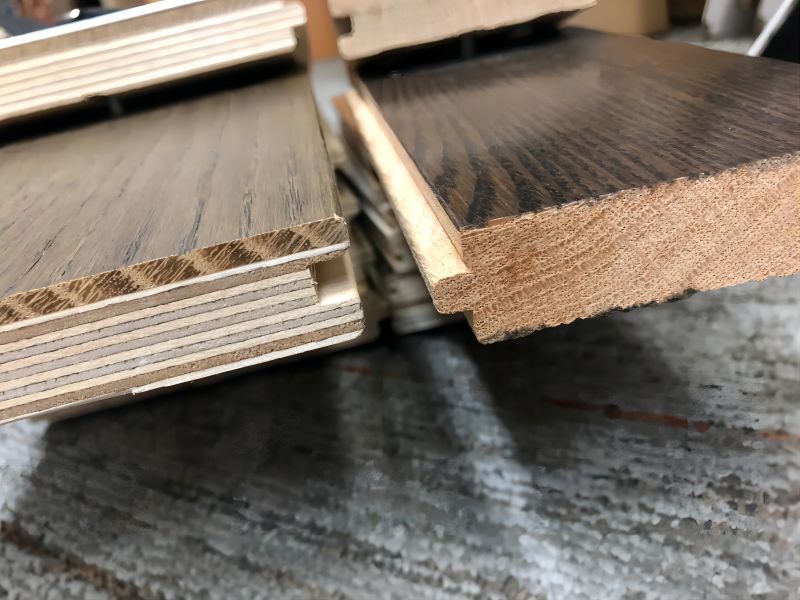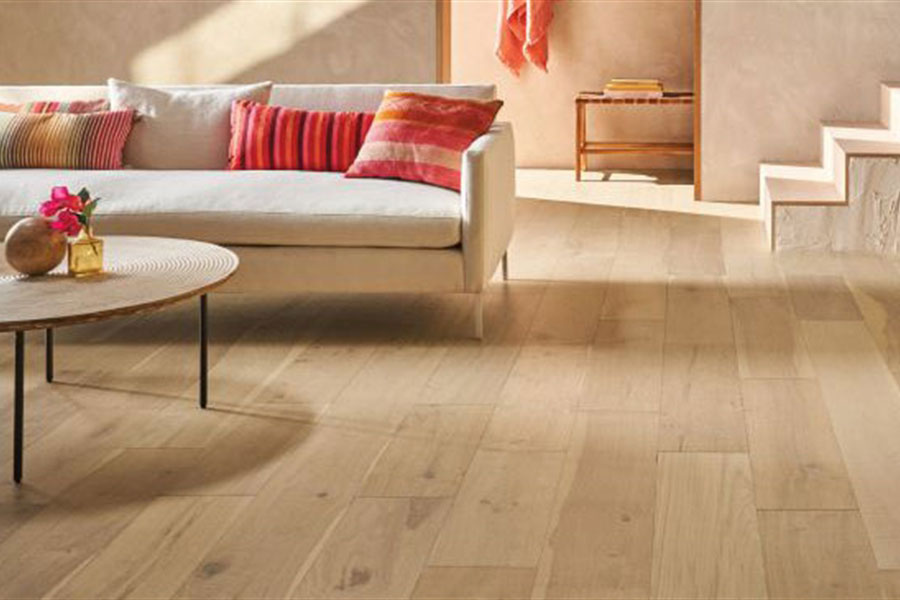Choosing the right flooring, whether hardwood or engineered wood, is vital for aesthetics and functionality. While engineered wood is better at resisting moisture and yet has a similar appearance to hardwood, it is highly durable and suitable for use in kitchens and basements.
Understanding these differences ensures informed, suitable choices for any space.
Table of Contents
ToggleBy Comparison:
Features | Hardwood Wood Flooring | Engineered Wood Flooring |
Composition | Solid wood | Layered construction with real wood veneer |
Installation | Nailed or glued down | Can be nailed, glued, or floated |
Stability | Susceptible to moisture and temperature changes | More stable, less prone to warping and cupping |
Appearance | Natural, unique grain patterns | Consistent appearance, fewer natural variations |
Refinishing | Can be sanded and refinished multiple times | Limited sanding and refinishing capabilities |
Cost | Higher initial cost | Generally more affordable upfront |
Durability | Durable and long-lasting | Prone to scratches and dents over time |
Environmental Impact | Renewable resource, eco-friendly | Uses less solid wood, more environmentally friendly |
Maintenance | Requires regular maintenance and care | Easier to maintain, less prone to damage |
Hardwood flooring
Types of Wood Used:
- Oak: Known for its strength and classic grain patterns, versatile for both traditional and modern interiors.
- Maple: Prized for its light color and fine, uniform grain, ideal for a clean, contemporary look.
- Cherry: Offers a rich, warm hue and smooth grain, adding elegance and warmth.
- Walnut: Rich, dark tones with eye-catching grain make this setting ideal for opulent and refined environments.
- Hickory: Renowned for having a unique grain and being firm, giving it a rustic appeal and character.
- Birch: Pale color and smooth grain, providing subtle and understated elegance.
Solid Wood Planks:
- Extends the life of the floor and allows homeowners to refresh its appearance over time.
- Known for their timeless appeal.
- Adds significant value to a home.
Engineered Wood Flooring
Layers and Materials Used:
Top Veneer Layer:
A thin slice of real hardwood.
Provides the same visual appeal and texture as solid wood.
Different kinds of wood can be used to make veneer:
- Oak
- Maple
- Cherry
- Walnut
- Hickory
- Birch
Allows for diverse aesthetic options.
Core Layers:
- Several layers of high-density fiberboard (HDF) or plywood.
- Bonded together in a cross-grain configuration.
- Superior dimensional stability.
- Resistance to warping and swelling due to environmental changes.
Durability and Stability Comparison
Solid wood Flooring
Susceptibility to Moisture and Temperature Changes:
- Requires careful installation and maintenance to manage environmental impacts
- Not ideal for basements, bathrooms, or kitchens without proper moisture barriers
Lifespan:
- Can last for several decades (50+ years) with proper care and maintenance
- Longevity depends on wood type, usage, and maintenance
Refinishing Potential:
- Refinishing helps restore the original appearance by removing surface scratches, stains, and wear
- Wood plank thickness determines refinishings: typically three to five for normal hardwood.
Engineered Wood Flooring
Better Moisture Resistance:
- Designed to tolerate greater moisture content than pure hardwood
- Less prone to warping, buckling, or swelling due to humidity changes
- Core layers of high-density fiberboard (HDF) or plywood improve resistance to moisture infiltration
Stability in Varying Conditions:
- Dimensional Stability:
- Core layers are constructed in a cross-grain pattern, enhancing stability
- Less prone to expansion and contraction than solid wood
- Temperature Resistance:
- Maintains structural integrity in fluctuating temperatures
- Ideal for regions with significant seasonal climate changes
- Installation Versatility:
- Installable above radiant heating systems and concrete slabs
- Suitable for various subfloor types due to enhanced stability
- Maintenance and Durability:
- Requires less maintenance than solid hardwood in varying conditions
- Retains appearance and performance in diverse environmental settings
Installation Process Comparison
Solid wood Flooring
Nail-Down Method:
- Nails are used to fasten hardwood planks to the subfloor.
- This method is typically employed for thicker solid wood planks.
- Itresults in a sturdy and stable floor.
Staple-Down Method:
- Hardwood planks are fastened using staples instead of nails
- Faster installation process compared to nail-down
- Suitable for thinner solid wood planks
- Also requires a wooden subfloor
Professional Installation Recommended:
- Expertise:
- Ensures correct installation techniques are used
- Reduces risk of damage to the flooring and subfloor
- Precision:
- Proper alignment and spacing of planks
- Accurate handling of moisture barriers and underlayment
- Tools and Equipment:
- Professionals have specialized tools for efficient and effective installation
- Reduces the need for homeowners to purchase or rent tools
- Warranty Protection:
- Professional installation may be required to maintain manufacturer warranties
- Ensures adherence to warranty guidelines and standards
- Time and Effort:
- Saves homeowner’s time and effort
- Expert installers are able to finish the task faster and more effectively.

Environmental Impact Comparison
Solid wood Flooring
Source:
- Harvested from mature trees, often from old-growth forests
- Potential depletion of slow-growing species
Sustainability:
- Requires responsible sourcing and certification (e.g., FSC-certified wood)
- Concerns about illegal logging and non-sustainable forestry practices
Impact of Deforestation:
- Deforestation causes habitat damage and wildlife loss
- Trees act as carbon sinks; their removal releases stored carbon dioxide
- Tree roots stabilize soil; deforestation increases erosion and land degradation
- Forests play a key role in the water cycle; deforestation affects rainfall patterns and water quality
Engineered Wood Flooring
Use of Recycled Materials:
Resource Efficiency:
- Utilizes smaller pieces of wood, reducing waste
- Utilizes timber that could be thrown away otherwise
Lower Impact on Forests:
- Reduced Demand for Solid Wood:
- The top veneer layer requires less wood compared to solid hardwood planks
Sustainable Sourcing:
- Core materials can be sourced from fast-growing, renewable wood species
- Encourages more efficient use of forest resources
Enhanced Stability:
- Extended longevity and robustness minimize the requirement for regular replacements
- Lower overall consumption of raw wood materials
Cost Comparison
Solid Wood Flooring
Initial Purchase Cost
- Hardwood flooring is often priced higher than engineered wood flooring due to the quality and durability of solid wood planks.
- Several factors, such as the kind of wood species, the grade of the wood, and the surface polish, can greatly affect the cost of hardwood flooring.
- The average cost of hardwood flooring is $5 to $15 per square foot.
- This range reflects the differences in wood species, quality, and finish, with premium options like exotic woods or high-grade finishes being more expensive.
Installation Cost
- Installing hardwood flooring is often more labor-intensive and costly compared to other flooring options, requiring precise handling and expertise.
Due to the complexity of the installation process, which involves nailing or stapling the planks to the subfloor, professional installation is recommended to ensure a high-quality and durable finish. - The average installation cost for hardwood flooring ranges from $4 to $8 per square foot. This cost covers the labor involved in preparing the subfloor, aligning the planks, and securing them in place.
Engineered Wood Flooring
Initial Purchase Cost
- Desirable for customers on a tight budget.
- The quality of the core components (high-density fiberboard or plywood) and the veneer (the top layer of wood) might affect the price of engineered wood flooring.
- On average, engineered wood flooring costs range from $3 to $10 per square foot. This range reflects differences in the quality of the materials and the thickness of the veneer layer, with higher-end options being more durable and aesthetically appealing.
Installation Cost
- Engineered wood flooring is a popular option for do-it-yourselfers since it is typically less expensive and easier to install than hardwood.
- It can be put in multiple ways, such as glue-down, nail-down, or floating (click-lock), giving you the flexibility to fit diverse flooring conditions and tastes.
- The average installation cost for engineered wood flooring ranges from $2 to $5 per square foot. This cost-effective range reflects the relative ease of installation and the versatility of the installation methods available.
Conclusion
Choosing between hardwood and engineered wood flooring depends on your budget, installation preferences, and long-term goals. Hardwood has a higher initial cost and requires more intricate installation, but it has better longevity and resale value.
Engineered wood, available from numerous engineered wood flooring manufacturers, is more affordable, easier to install, and performs better in variable conditions, though it has limited refinishing potential. Both options provide unique benefits, making either a solid choice for enhancing your home’s aesthetic and value.

